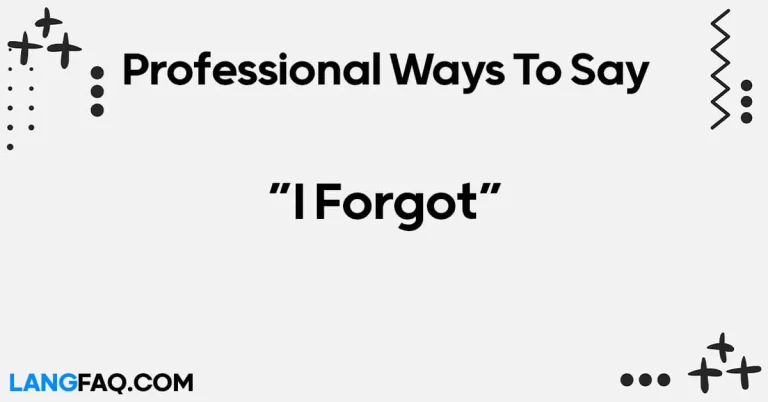Engaging in meaningful discussions is pivotal in various aspects of life. Whether it’s during meetings, debates, or casual conversations, the ability to express the desire to delve deeper into a topic is crucial. In this article, we will unveil 12 other ways to say “Discuss Further.” By broadening your vocabulary, you can articulate your thoughts more precisely, fostering effective communication. Let’s embark on this linguistic journey together.
12 Other Ways to Say “Discuss Further”
Here are 12 other ways to express “Discuss Further”:
- Delve Deeper: Explore the topic more profoundly.
- Elaborate On: Provide more details or expand the discussion.
- Extend the Conversation: Prolong the dialogue for a more in-depth exploration.
- Explore in Detail: Scrutinize the subject matter more closely.
- Deepen Our Understanding: Foster a deeper comprehension of the matter.
- Investigate Further: Conduct a more thorough examination or inquiry.
- Uncover More Insights: Discover additional perspectives and valuable insights.
- Examine More Closely: Scrutinize the details with a closer examination.
- Expand on This Point: Provide more information or elaborate on a specific aspect.
- Continue the Dialogue: Sustain the conversation for ongoing discussion.
- Inquire Deeper: Pose additional questions or seek further clarification.
- Open the Floor for More Discussion: Invite others to contribute and share their thoughts actively.
Here is a table with meanings and examples for the 12 other ways to say “Discuss Further”:
| Expression | Meaning | Example |
|---|---|---|
| Delve Deeper | Explore more profoundly. | “Let’s delve deeper into the implications of this decision.” |
| Elaborate On | Provide more details or expand. | “Could you elaborate on your proposal?” |
| Extend the Conversation | Prolong the dialogue for depth. | “I suggest we extend the conversation to cover all relevant aspects.” |
| Explore in Detail | Scrutinize the subject more closely. | “We need to explore this concept in detail to understand its implications.” |
| Deepen Our Understanding | Foster a deeper comprehension. | “To solve this issue, we must deepen our understanding of the root causes.” |
| Investigate Further | Conduct a more thorough inquiry. | “The team will investigate further to identify the source of the problem.” |
| Uncover More Insights | Discover additional perspectives. | “Let’s analyze the data to uncover more insights into consumer behavior.” |
| Examine More Closely | Scrutinize the details closely. | “We need to examine this contract more closely before making any decisions.” |
| Expand on This Point | Provide more information or details. | “Could you please expand on this point to give us a clearer picture?” |
| Continue the Dialogue | Sustain the conversation. | “I appreciate your input; let’s continue the dialogue to find common ground.” |
| Inquire Deeper | Pose additional questions. | “I would like to inquire deeper into the methodology used for this research.” |
| Open the Floor for More Discussion | Invite active participation. | “Before we conclude, let’s open the floor for more discussion and input from everyone.” |
These diverse expressions offer a rich tapestry of alternatives to convey the idea of “Discuss Further.” Whether you aim to delve more deeply into a topic, elaborate on specific points, or foster a sustained dialogue, these phrases provide nuanced ways to enhance communication.
By incorporating these alternatives into your language repertoire, you can elevate the quality of your discussions, encouraging comprehensive exploration and active participation.
Is It Correct to Say “Discuss Further”?
Absolutely! “Discuss Further” is a perfectly valid and commonly used phrase in the English language. It’s a polite and straightforward way to express the intention to explore a topic in more detail or to continue a conversation with greater depth.
When to Use “Discuss Further”:
- Professional Settings: In meetings, presentations, or business discussions, you might use “Discuss Further” to signal a need for more in-depth exploration of a particular point.
- Academic Context: It’s suitable in academic environments, such as classrooms or research discussions, to indicate a desire for deeper analysis or consideration.
- Everyday Conversations: In casual conversations, you can use it when chatting with friends or family to express an interest in exploring a topic more thoroughly.
Example Sentences:
- “I think we’ve covered the basics; now, let’s discuss further to identify potential challenges and solutions.”
- “Your insights on the market trends are valuable. Can we schedule another meeting to discuss further strategies for the upcoming quarter?”
- “I appreciate your initial thoughts on the project. Let’s discuss further during our next team meeting to finalize our approach.”
Using “Discuss Further” demonstrates a commitment to a comprehensive understanding of a subject and encourages others to contribute more to the conversation. It’s a versatile and effective expression for various contexts.
Professional Mail Example With “Discuss Further”
Subject: Proposal Review Meeting – Request to Discuss Further
Dear [Recipient’s Name],
I trust this email finds you well. I am writing to follow up on the recent submission of the proposal for the upcoming project. Thank you for your thorough work in preparing the document.
Upon reviewing the proposal, I believe there are several aspects that would benefit from further discussion to ensure alignment with our project objectives. I appreciate the effort that has gone into the initial draft, and I am confident that a more in-depth conversation will help us refine certain elements.
Could we schedule a meeting next week to discuss further the key components of the proposal? I am particularly interested in exploring potential challenges, refining our approach, and ensuring that all team members are on the same page regarding our strategic direction.
Your insights and contributions to this discussion will be invaluable in shaping the final version of the proposal. Please let me know your availability for a meeting, and we can coordinate a time that works for all involved.
Thank you for your dedication to this project, and I look forward to our collaborative efforts in refining the proposal.
Best regards,
[Your Full Name] [Your Position] [Your Company] [Your Contact Information]
Delve Deeper: Unveiling Profound Insights
In the realm of meaningful conversations, the phrase “Delve Deeper” serves as a powerful tool to express the need for a more profound exploration of a subject. This term is highly versatile, fitting seamlessly into both formal and informal contexts.
When to Use:
- Formal Context (Workplace): During a professional meeting, you might use this phrase to encourage a more in-depth analysis of a business strategy or project.
- Informal Context (Friendship): When discussing personal experiences or shared interests with friends, “Let’s delve deeper into our memories from that trip” can initiate a more detailed conversation.
Example Sentence: “In our team meeting, let’s delve deeper into the financial projections to ensure a comprehensive understanding of our quarterly goals.”
Email Sample:
Elaborate On: Providing Depth to Discussions
The phrase “Elaborate On” is a sophisticated way to request more details or expansion on a particular topic. Its formal connotation makes it suitable for professional settings, but its adaptability allows it to transcend into casual conversations.
When to Use:
- Formal Context (Meeting): In a business meeting, you might ask a colleague to elaborate on a proposed marketing strategy.
- Informal Context (Friend Gathering): Among friends, using this phrase can turn a simple story into a more detailed and engaging narrative.
Example Sentence: “Could you please elaborate on the key points of your presentation, especially regarding the market trends we anticipate?”
Email Sample:
Subject: Request for Elaboration on Monthly Reports
Dear [Colleague’s Name],
I trust you are well. I would appreciate it if you could elaborate on the insights presented in the monthly reports during our upcoming team meeting.
Best regards, [Your Name]
Extend the Conversation: Prolonging and Enriching Dialogue
“Extend the Conversation” is a versatile phrase that suggests a desire to prolong and enrich a discussion. Whether in a professional setting or a casual gathering, this expression encourages participants to contribute more thoughts and perspectives.
When to Use:
- Formal Context (Conference): In a conference, you might use this phrase to suggest a more extended Q&A session to cover diverse perspectives.
- Informal Context (Family Gathering): With family, saying, “Let’s extend the conversation about our summer plans” can lead to more comprehensive discussions.
Example Sentence: “Given the complexity of the topic, I suggest we extend the conversation to ensure all viewpoints are thoroughly considered.”
Email Sample:
Subject: Proposal to Extend Discussion Time
Dear [Recipient’s Name],
I hope this email finds you in good spirits. Considering the importance of our upcoming discussion, I propose we extend the conversation to allow for a more comprehensive exploration of the subject.
Warm regards, [Your Name]
Explore in Detail: Scrutinizing Specifics
To express a meticulous approach to understanding, “Explore in Detail” is an ideal phrase. It conveys a commitment to examining specific aspects thoroughly, making it suitable for both professional and informal discussions.
When to Use:
- Formal Context (Project Review): In a project review meeting, you might use this phrase to suggest a closer examination of certain project components.
- Informal Context (Book Club): When discussing a book with friends, saying, “Let’s explore in detail the character development” can lead to a more insightful conversation.
Example Sentence: “Before finalizing the proposal, I recommend we explore in detail the potential challenges and mitigation strategies.”
Email Sample:
Subject: Request to Explore Project Details
Dear Team,
I trust this email finds you well. As we approach the project deadline, I propose that we explore in detail the specific tasks assigned to each team member during our upcoming meeting.
Best regards, [Your Name]
Deepen Our Understanding: Fostering In-Depth Comprehension
“Deepen Our Understanding” goes beyond surface-level discussions, emphasizing the importance of gaining profound insights for a comprehensive grasp of the topic. This phrase is suitable for various contexts, balancing formality and approachability.
When to Use:
- Formal Context (Training Session): In a training session, you might encourage participants to deepen their understanding of a new process or technology.
- Informal Context (Study Group): When studying with peers, suggesting, “Let’s deepen our understanding of this concept” can enhance collaborative learning.
Example Sentence: “To address the client’s concerns effectively, I propose that we deepen our understanding of their specific requirements.”
Email Sample:
Subject: Proposal to Deepen Our Understanding of Client Needs
Dear Team,
I hope this message finds you well. As we prepare for the client meeting next week, I propose that we schedule a session to deepen our understanding of their needs and expectations.
Kind regards, [Your Name]
Investigate Further: A Quest for Additional Information
“To Investigate Further” is apt when additional information is essential for a comprehensive understanding. This phrase can be seamlessly integrated into both formal and informal conversations, signaling a commitment to thorough exploration.
When to Use:
- Formal Context (Research Project): In a research project, you might suggest investigating further to gather additional data or insights.
- Informal Context (Friend’s Dilemma): When a friend shares a complex situation, saying, “Let’s investigate further before offering advice” demonstrates a thoughtful approach.
Example Sentence: “Before finalizing our proposal, I recommend that we investigate further to ensure we have all the necessary data to support our recommendations.”
Email Sample:
Subject: Proposal to Investigate Further for Project Success
Dear [Recipient’s Name],
I trust you are well. Considering the importance of our upcoming project, I propose that we schedule a meeting to investigate further and gather additional insights.
Best regards, [Your Name]
Uncover More Insights: A Quest for Nuanced Perspectives
“Uncover More Insights” invites participants to seek hidden or nuanced perspectives, enriching the overall discussion. This phrase is versatile, fitting seamlessly into both formal and informal contexts.
When to Use:
- Formal Context (Strategy Meeting): In a strategy meeting, suggesting to uncover more insights can lead to innovative solutions.
- Informal Context (Friend’s Story): When a friend shares a personal story, saying, “Let’s uncover more insights into your experience” shows empathy and interest.
Example Sentence: “As we approach the product launch, I encourage each team member to share their ideas to uncover more insights that can contribute to our success.”
Email Sample:
Subject: Request to Uncover More Insights for Project Enhancement
Dear Team,
I hope this email finds you in good health. Considering the significance of our upcoming project, I propose that we schedule a brainstorming session to uncover more insights and perspectives.
Warm regards, [Your Name]
Examine More Closely: A Meticulous Approach to Analysis
To “Examine More Closely” involves scrutinizing the subject with attention to detail. This phrase is suitable for situations requiring precision and thorough examination, fitting seamlessly into both formal and informal conversations.
When to Use:
- Formal Context (Quality Assurance): In a quality assurance meeting, suggesting to examine more closely ensures a meticulous review of processes.
- Informal Context (Home Improvement): When planning home improvements with family, saying, “Let’s examine more closely the details of the renovation” can lead to well-thought-out decisions.
Example Sentence: “Before finalizing the budget proposal, I recommend that we examine more closely the financial projections and potential cost variations.”
Email Sample:
Subject: Proposal to Examine More Closely for Budget Accuracy
Dear [Recipient’s Name],
I trust this email finds you well. Considering the importance of our budget proposal, I propose that we schedule a meeting to examine more closely the financial projections.
Best regards, [Your Name]
Expand on This Point: Providing Comprehensive Information
To “Expand on This Point” urges participants to provide more details or elaborate on specific aspects. This phrase fosters a more comprehensive and nuanced conversation, suitable for both formal and informal discussions.
When to Use:
- Formal Context (Presentation): During a presentation, you might encourage a colleague to expand on a specific point to enhance audience understanding.
- Informal Context (Book Club): When discussing a book with friends, saying, “Let’s expand on this point about the protagonist’s motivations” can lead to a more insightful conversation.
Example Sentence: “Your insights on the market trends were valuable; could you please expand on this point about potential challenges and mitigation strategies?”
Email Sample:
Subject: Request to Expand on Project Details
Dear [Colleague’s Name],
I hope this email finds you in good spirits. Your recent presentation was insightful, and I would appreciate it if you could expand on certain points during our upcoming team meeting.
Warm regards, [Your Name]
Continue the Dialogue: Fostering Ongoing Conversations
“Continue the Dialogue” emphasizes the ongoing nature of the discussion, signaling a commitment to sustained and meaningful conversations. This phrase is versatile, fitting seamlessly into both formal and informal contexts.
When to Use:
- Formal Context (Collaboration): In a collaborative project, suggesting to continue the dialogue ensures ongoing communication among team members.
- Informal Context (Family Gathering): During a family gathering, saying, “Let’s continue the dialogue about our plans for the upcoming celebration” can lead to more inclusive decision-making.
Example Sentence: “Given the complexity of the issue at hand, I suggest we continue the dialogue to explore potential solutions and gather diverse perspectives.”
Email Sample:
Subject: Proposal to Continue the Dialogue for Project Success
Dear Team,
I trust this email finds you well. As we navigate the challenges of our ongoing project, I propose that we schedule regular check-ins to continue the dialogue and address any emerging issues.
Warm regards, [Your Name]
Inquire Deeper: Posing Thoughtful Questions
“Inquire Deeper” involves posing additional questions or seeking clarification, creating an interactive and engaging conversation. This phrase is suitable for various contexts, including formal and informal settings.
When to Use:
- Formal Context (Interview): In a job interview, expressing a desire to inquire deeper about the company’s values demonstrates genuine interest.
- Informal Context (Friend’s Experience): When a friend shares a personal experience, saying, “I’d like to inquire deeper about your journey” shows curiosity and empathy.
Example Sentence: “Your initial findings are insightful; I’d like to inquire deeper into the methodologies employed to gather this data.”
Email Sample:
Subject: Request to Inquire Deeper into Project Findings
Dear [Recipient’s Name],
I hope this email finds you in good health. Your recent report was intriguing, and I’d like to inquire deeper into some of the findings during our upcoming meeting.
Best regards, [Your Name]
Open the Floor for More Discussion: Encouraging Active Participation
“Opening the floor for more discussion” invites participants to actively contribute and share their thoughts. This phrase is versatile, fitting seamlessly into both formal and informal conversations.
When to Use:
- Formal Context (Meeting): In a business meeting, suggesting to open the floor for more discussion encourages diverse viewpoints.
- Informal Context (Group Project): During a group project with friends, saying, “Let’s open the floor for more discussion on the project timeline” fosters collaborative decision-making.
Example Sentence: “Before we conclude, I’d like to open the floor for more discussion. I encourage everyone to share their thoughts and suggestions on our next steps.”
Email Sample:
Subject: Invitation to Open the Floor for More Discussion
Dear Team,
I hope this message finds you well. As we prepare for our upcoming team meeting, I extend an invitation to open the floor for more discussion. Your insights are crucial to our collective success.
Kind regards, [Your Name]
Frequently Asked Questions (FAQs)
What are some formal alternatives to saying “Discuss Further” in a professional setting?
In professional settings, you can use phrases such as “Delve Deeper,” “Explore in Detail,” and “Examine More Closely” to convey your intention to discuss a topic further.
How can I encourage more participation in a discussion?
To encourage more participation, consider using phrases like “Extend the Conversation,” “Continue the Dialogue,” and “Open the Floor for More Discussion.” These expressions create a welcoming environment for active participation.
Are there specific situations where “Investigate Further” is more appropriate?
“Ivestigate Further” is suitable when there’s a need for thorough research or exploration, especially in scenarios where additional information is essential for a comprehensive understanding.
Can I use these alternatives in written communication?
Absolutely! These alternatives are versatile and can be seamlessly integrated into written communication, including emails, reports, and other written correspondence.
How can I diplomatically request more information during a conversation?
Phrases like “Inquire Further” and “Uncover More Insights” can be employed diplomatically to request additional information. These expressions convey curiosity and a genuine interest in gaining more insights.
Is there a difference between “Deepen Our Understanding” and “Dive Into the Details”?
While both phrases emphasize a comprehensive approach, “Deepen Our Understanding” is broader, focusing on gaining profound insights. On the other hand, “Dive Into the Details” suggests a more specific and detailed examination of certain aspects.
Conclusion:
Mastering various ways to express the desire to “Discuss Further” enhances communication skills and fosters more profound interactions. By incorporating these alternatives into your vocabulary, you not only diversify your language but also convey a nuanced approach to discussions. Embrace these phrases to elevate the quality of your conversations and establish yourself as a skilled communicator.







